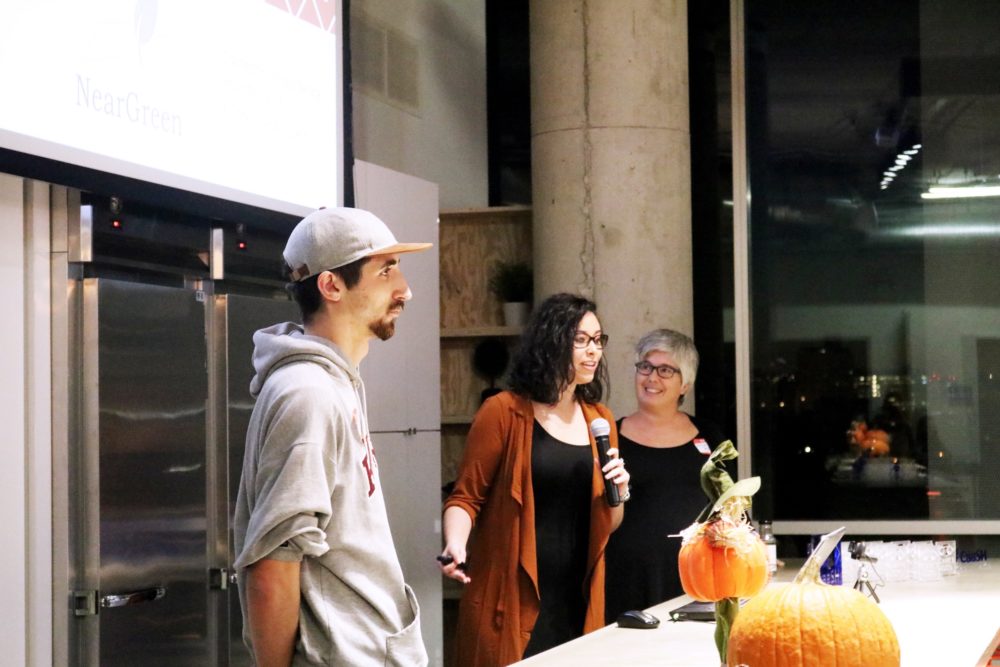This is a guest post in partnership with Code for Philly, in advance of its Civic Engagement Launchpad that kicks off this Friday. RSVP here.
At 9.55 a.m. I pulled into an empty hybrid vehicle spot and watched a few people enter the building. I stayed in the car for a while, not yet ready to go in. It wasn’t my first hackathon, but it was the first I’d gone to alone, and this was Code for Philly, and we were meeting at Curalate, and this made everything feel very tech-hipster-ish. And scary.
I’d signed on as an observer of sorts. I was working on a book that introduces tech and coding to girls. I’d been talking with Code for America, because I wanted my readers to understand that tech was about making the world better. I came looking for stories.
I took a breath and left my car. Only a few paces later, I was still stalling, iPhone out, typing notes that later made it into my book: “The first five minutes will be the hardest, but after that it gets better. It always does.” With that I opened the glass door, said hi to the guy behind the security desk and took the elevator upstairs. Soon enough I was chatting with the Code for Philly folks checking people in. They gave me a light blue hackathon T-shirt and pointed me toward coffee.
Before I tell you what happened, let me just say: If I can get myself to a hackathon and stay with it, so can you. I’m a writer, not a developer (yet). I’m shy, older and prefer to spend time alone.
All of which, it turned out, made me the perfect person to hang with the very welcoming Code for Philly crowd.
That’s not to say I had ten best friends the minute I walked in. I stashed the T-shirt in my bag and found a seat near the window. Next to me was a new guy from D.C., there to check out the Philly tech scene, and we talked. Soon enough, Marissa Goldberg came in the door. We’d met a few weeks back at Tonic Design’s Women in Tech Roundtable. She was collecting people for her team. I happily joined, and soon met the rest of the gang: Brad, a back-end developer, and Nke, a CS student at Community College of Philadelphia. Meaghan, a front-end whiz came later that day, and we had lots of help from the mentors who checked in on each team.
Good teams really are about more than just code.
Our project: NearGreen, an app that popularizes a city report about healthy grocery stores and allows you to enter your address and see a map of stores with healthy food near you.
At the time, I knew a few lines of Python, a dash of HTML and CSS. I could program ten lines in Arduino and make LEDs flicker. I had a Github account but knew not what to do with it. I’d certainly never worked on a dev team that shared active files, and I didn’t yet know what “fork” meant.
I hung on though and asked lots of questions. It turned out that I had much-needed skills: in content-strategy and research, and in what would be called requirements analysis — knowing the cultural context and needs. I’m also relatively fearless about calling and emailing people, which meant we soon made contact with the city office that created the report. Code is central to the creating an app or software, but good teams really are about more than just code.
I’m proud to say that I not only stayed through dinner that night, I met with my team throughout the next month. We chatted on our new Slack channel and met up one night at LocalHost. Before we knew it, a month had passed and we were at demo night, hosted by SEER Interactive.

Our NearGreen app aimed to make it easier to find healthy food within walking distance. I had driven to demo night through food-desert parts of the city. It’s easy to get lost in code and design and questions about filling a database; this drive brought home the radical commitment to civic life that Code for Philly stands for.
Would I do it again? You bet. I signed up for spring Launchpad as soon as registration opened. I learned so much the first time around. It inspired me to continue my journey to learn Javascript and full stack development. There’s magic to having an idea and being able to build it, much as carpenters do, as artists do. I want in on that. I also loved the teamwork. Ideas do get better with discussion, with group expertise and group trial and error.
And besides: at demo night, NearGreen won the Jawn Audience Award. They liked us!
This community is warm and generous. I can’t wait to reunite with Marissa, Brad and the rest of my team, and meet more of the Code For Philly crowd. I know, it’s totally geeky, but I’m really excited and can’t wait for March 24. This time around, I won’t be stalling in my car, but bounding right in.
My message to you: if you’re reading this and are still unsure? Come. Look for me, and I’ll be your CE Launchpad friend. I’ve got short gray hair and I usually wear black. Be on my team. We’ll be working on the next phase of NearGreen, and there’s plenty, plenty to do if you aren’t a developer.







